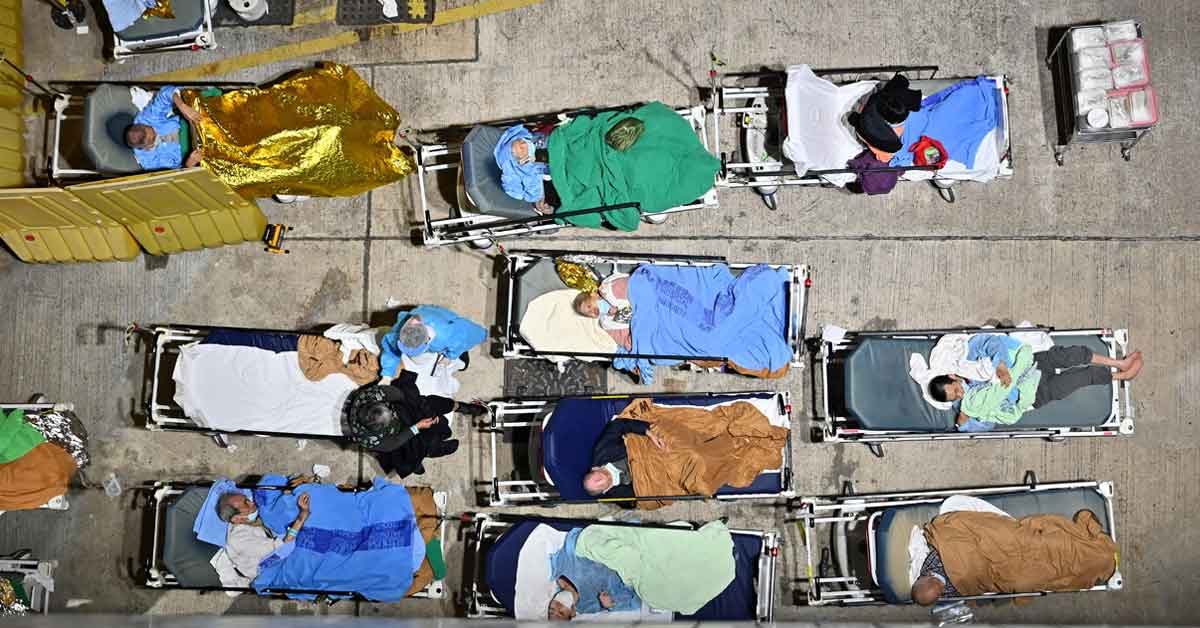Huddled under blankets and thermal shields, dozens of elderly patients shivered on gurneys outside a hospital serving one of Hong Kong's poorest communities – a grim tableau for the city as its health system buckles under an Omicron-fuelled coronavirus wave.
We call this the fever zone," a nurse in full-body protective gear told AFP, declining to be named. "Don't get too close."
Hong Kong is in the throes of its worst coronavirus outbreak, and record new daily infections have pushed hospitals in the finance hub to the breaking point.
On Monday, Caritas Medical Centre in Sham Shui Po district started setting up isolation tents outside its facilities – initially limiting one COVID patient per tent.
But by nightfall Wednesday, entire families were crammed into the tents, while about 50 others languished in the February chill on hospital beds wheeled outside.
"Some of my colleagues say we are now in battlefield mode," said David Chan, an emergency room nurse at Caritas who is also the acting president of Hong Kong's Hospital Authority Employees Alliance.
"We are worried that the patients' conditions will worsen later this week," he told AFP, calling the situation "very undesirable".
One of Chan's big concerns was the forecast for wet weather.
Later that evening, rain began to fall.
Unvaccinated Elderly
Like mainland China, Hong Kong has adhered to a zero-COVID strategy, which has largely kept the virus out but left the business hub cut off from the world.
Until the most recent outbreak, all patients were treated in dedicated COVID isolation wards, and close contacts were sent to a quarantine camp.
But the extremely contagious Omicron virus variant has left authorities scrambling and exposed shortcomings in plans to deal with a major outbreak.
On Wednesday, the daily caseload hit a record 4,285 confirmed infections with a further 7,000 preliminary positives in the densely packed city of 7.5 million.
Before the latest wave, Hong Kong had recorded just over 12,000 cases since the beginning of the pandemic.
Health experts say the daily case numbers could rise to 28,000 by March.
Especially vulnerable are Hong Kong's vaccine-hesitant elderly.
Despite ample supplies, only 43 percent of those aged 70-79 and 26 percent of over-80s opted to get jabbed.
Last week, the government said people with mild cases could isolate at home but by Wednesday, there were still 12,000 people waiting to be hospitalised.
'No Plan'
At Caritas, the wave of patients has left staff "exhausted, stressed out and helpless", Chan said.
"It's so painful that we have been working non-stop but we still cannot take care of every patient properly," he told AFP, adding that the current crisis outpaced what they faced at the beginning of the pandemic.
"Back then, we did not know the virus well and we were short of equipment," he said.
"Two years on, we expected the Hospital Authority to have better plans – but there turned out to be none."
City leader Carrie Lam ruled out a hard, China-style lockdown on Tuesday.
But the following day, Beijing-controlled newspapers carried an order from President Xi Jinping telling Hong Kong authorities to take "all necessary measures" to control the outbreak.
Yet it remains unclear whether Hong Kong could ever make it back to zero COVID cases, given the rapidly increasing number of infections in the territory.
'Sandcastles In A Tsunami'
The government has opened temporary COVID clinics and plans to build a makeshift mega-hospital.
It also plans to requisition 3,000 unoccupied public housing apartments and is looking into whether hotels can house some cases.
But whether those measures will come in time remains to be seen.
In the Caritas parking area past the "fever zone", a worried mother cradled her two-year-old – trying to keep the toddler comfortable as they waited in the 15-degree Celsius (59 degrees Fahrenheit) chill.
"I kept calling the (government COVID) hotlines but none of them connected," the woman, who provided just her surname Chau, told AFP, adding that her daughter was running a high fever.
When they arrived two hours prior, nurses instructed her to get tested – which could take hours as she joined some 120 people waiting outside Caritas.
"They have no wards for you, so you have no choice but to go home," Chau said.
Healthcare professionals have long warned that Hong Kong's public hospitals were underfunded and unprepared for a coronavirus surge.
Even during previous flu outbreaks, hospitals had "buckled", said Siddharth Sridhar – a microbiologist at the University of Hong Kong – in a tweet Wednesday.
"Now, with a disease that is more transmissible/severe than flu, and requires exposed staff to quarantine, HK's hospitals are sandcastles in a tsunami."
